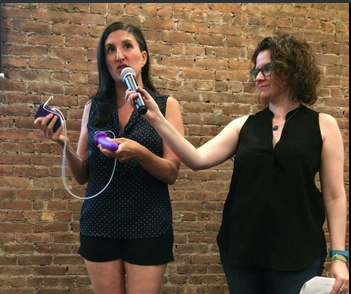Sensors, wearables and devices: Progress, fashion or better sex?

By Dennis Clemente
If last August 27’s meetup at WeWork is any gauge, Ignite NYC may just be the counterculture group to NY’s predominant pitch-and-get-funded startup scene, the way it tackled how people relate to sensors, wearables and devices from various anthropological, existential, medical and even recreational standpoints.
The speakers presented their ideas and thoughts on the subject with an academic formality and with just enough eccentricity to appear like the East Coast of TED Talks—only shorter, unfortunately. A welcome change in the tech space indeed!
Jacqueline Kurdziel, the first presenter, cited a study about how “people are more open to (talking to) a virtual shrink.” It made us think how the premise of “Her,” a movie about a man’s romantic relationship with his operating system, can happen to us sooner than we think. People’s tastes and habits, she said, evolve with their web-based interaction.
Virtual empathy, it seems, can carry us through our loneliness, but only up to a point. The next presenter makes a strong point about how we will still crave for physical contact with another human being. Said Lux Alptraum said, “We do not want to have sex with robots. We want to make our sex better.” She also brought up a tantalizing question, “What metrics are we using to measure sex?”
Alptraum showed the sex strap-ons, emphasizing the importance of its progeny—bionics, which essentially makes sex devices more affordable.
If all these sound too self-serving, former journalist Amy Vernon asked if all the technology we want is for the greater good or for ourselves — and where we need to draw the line with privacy.
Vernon thinks we’re at that point where we can’t have both privacy and progress. “We can’t complain about giving up our privacy at the same time that we love the technology that comes about as a result of the information we’re sharing ourselves. Still, how safe is our quantified selves?”
Adds Mari Kussman when it was her turn to speak, “Were quantifying like we know where we’re going and we’ve never made a mistake before.”
Kussman observes how IoT promises better living through ubiquitous connectivity. But she asked, “What metrics are we using to measure success (read: this better living)?”
Beyond the question of metrics, Krysytal D’Costa’s talk centered on how technology in general is making us better liars the more we lose our privacy.
D’Costa thinks even fitness wearables are teaching us to be better liars. “We are using social pressure to stay fit,” she said, “but are they really changing our behavior or simply teaching us to game the system?” If that means lying how much we’ve lost calories.
“Wearables help us with deception. We lie online, because it’s just easier to get away with it. It could be as simple as having a photo on your social networks taken years ago.” Online, we can certainly have a better version of ourselves.
Graeme Ossey thinks wearables are helpful as digital health devices. “Not only does it tap into the mainstream quantified-self movement but allows greater points of engagement for providers and patients.”
He looks forward to technology that prevents injuries, provides early diagnosis, reduces cost and time, and increases providers’ information.
All these talk about the rapid of technology is hogwash for Chris Allick. “2013 and 2014 were supposed to be “The Year of the IoT” connected devices and big data! A revolution was supposed to take place in which we would sit back and watched data, wearables, and sensors talk to each other, and magically our lives would be better.”
Well that has not happened. “I’ve researched most, if not all, of the development platforms for people to create products for the IoT and I’ve found some interesting things about people’s ability to understand scale and value.”
“Today, we don’t have an internet of things, we have an internet of products,” he added.
If IoT is not in the horizon, this could prove to be disappointing for Nick Doiron. He hopes to see new wearables and handheld technologies bring fictional plot devices to life.
Having studied product design, Bernard Mehl would be content though to see this happen in the workplace.
He longs for Star Trek technology at the workplace. “What do I have in my pocket now? Boring stuff,” he said. He’d like to know when a room is occupied and how to switch off lights when not in use.”
Ignite NYC was hosted by co-directors Oscar Torres and Martha Denton.